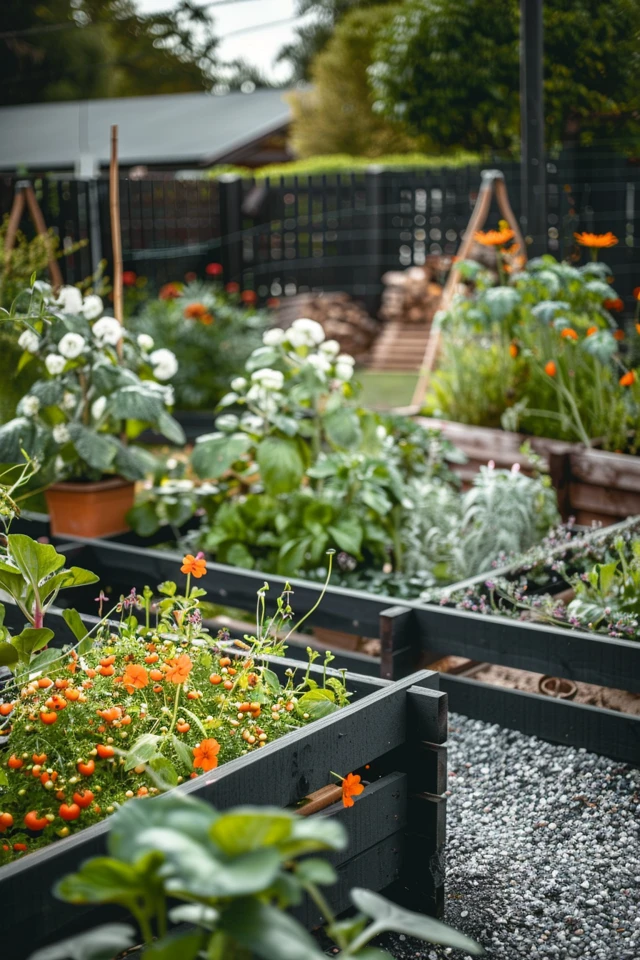I’m excited to share some fenced vegetable garden ideas that will transform your backyard into a thriving, protected oasis for your plants. Whether you’re a seasoned gardener or just starting out, having a fenced vegetable garden is essential to safeguard your hard work from wildlife and ensure a bountiful harvest.
When it comes to choosing the best fence for your vegetable garden, there are several factors to consider, such as cost, appearance, and durability. Wood, mesh, metal, and vinyl are popular options, each with its own advantages and considerations.
Wooden fences, made from rot-resistant woods like cedar or redwood, offer a classic, natural look. Wire mesh and plastic mesh fences are more affordable options that still provide effective protection. Metal fences, like chain-link, can be combined with wooden split rail fences for added stability and security. Vinyl fences, while more expensive, are extremely durable and offer privacy.

Keep in mind any height regulations that may apply when installing your fence. Certain animals, like deer, may require taller fences to keep them out. It’s important to research the regulations in your area to ensure compliance and choose a fence height that will effectively deter wildlife.
In the upcoming sections, I will provide you with some helpful tips for fencing your vegetable garden, as well as specific ideas for keeping out different types of animals that may try to nibble on your precious plants.
Key Takeaways:
- Choose a fence material that suits your needs, such as wood, mesh, metal, or vinyl.
- Consider the cost, appearance, and durability of each fence type.
- Check height regulations in your area, especially for animals like deer.
- Wooden fences offer a natural look, while wire and plastic mesh fences are more affordable.
- Combine metal fences with wooden split rail fences for added stability.
Tips for Fencing a Vegetable Garden
When it comes to protecting your vegetable garden, a well-designed fence is essential. Here are some tips to consider when fencing your vegetable garden:

- Consider raised bed garden fencing: If you have a small backyard, raised bed garden fencing can be a practical solution. Not only does it add a decorative touch, but it also allows for better drainage and easier weed control, ensuring your plants thrive.
- Check local height regulations: Before installing your vegetable garden fence, be sure to check the height regulations in your area. Compliance with these regulations will prevent any potential issues with local authorities and ensure your garden is protected effectively.
- Go the DIY route: For those who enjoy a hands-on approach, building your own vegetable garden fence can be a rewarding project. Consider using temporary wire or plastic mesh fences that can be mounted on metal T-posts or wooden stakes. This allows for flexibility and easy reconfiguration if needed.
- Opt for permanent solutions: If you prefer a more permanent and sturdy fence, sinking wooden or metal posts into the ground and securing them with concrete is a reliable option. Remember to set the posts straight before pouring the concrete to ensure a solid foundation.
- Add an extra level of protection: To keep smaller animals out of your garden, consider incorporating chicken wire or 1/2″ hardware cloth into your fence design. These materials act as a barrier, keeping pests at bay while allowing sunlight and air circulation.
Remember, a well-designed and properly installed vegetable garden fence not only protects your plants but also adds an element of beauty to your backyard. Whether you choose to go the DIY route or opt for a professional installation, make sure to consider these tips for a successful and productive vegetable garden.

Vegetable Garden Fencing Ideas for Specific Animals
Different animals require specific fencing solutions to keep them out of your vegetable garden. For deer, a tall fence of at least 7 feet is recommended. Electric fences can also be effective, but ensure they are allowed in your area and follow safety precautions. To prevent groundhogs and similar animals from burrowing under your fence, bury the bottom edge to a depth of 12 to 18 inches or use a loose L-shaped fence.
“A tall fence is essential to deter deer from entering your vegetable garden. By erecting a fence that is at least 7 feet high, you can prevent these hungry creatures from accessing your precious crops.”
For small animals like rabbits, a 3-4 feet high fence of chicken wire or attaching chicken wire to an existing wooden fence can be effective. This will prevent them from squeezing through or gnawing their way into your vegetable garden. Consider adding plants or decorative elements to make your fence more attractive while also serving as a deterrent to curious critters.
Easy Vegetable Garden Fence Ideas:
- Install a chicken wire fence around your vegetable garden to keep rabbits and other small animals at bay.
- Attach chicken wire to an existing wooden fence to prevent small animals from burrowing or climbing through.
- Add plants such as marigolds or lavender around the perimeter of your garden to repel pests.
Conclusion
Fencing your vegetable garden is crucial to protect your plants from wildlife and ensure a successful harvest. It is important to consider the type of fencing material that best suits your needs, whether it’s wood, mesh, metal, or vinyl. Additionally, take into account any height regulations in your area when determining the fence height that will effectively keep out animals like deer or rabbits.
Whether you choose to use raised bed garden fencing or traditional fencing methods, it is essential to properly install the fence. Additionally, consider additional measures like electric fences or burying the bottom edge of the fence to deter animals from accessing your garden.
By implementing the right fencing solution, you can enjoy a flourishing and critter-free harvest in your backyard. So don’t wait, start planning your vegetable garden fence today to protect your hard work and enjoy the fruits of your labor.

